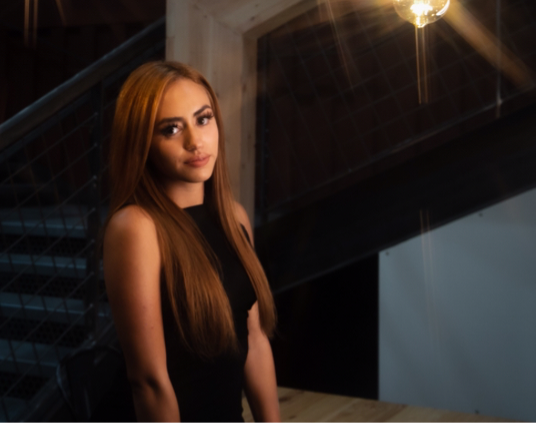by Kamila Kinyon
This Fall, we will be publishing a series of spotlight articles about multilingual students at DU. These articles are based on interviews that Kamila Kinyon conducted about students’ memories of becoming multilingual, their connection to their heritage language, and their experiences at DU. This project is funded by a 4D Infusion Grant awarded for 2022-23 to Juli Parrish and Kamila Kinyon. We welcome this opportunity to celebrate DU’s multilingual speakers and writers.
Paola Gascot, a junior at DU, is studying environmental science with minors in Spanish and sustainability. Originally from Puerto Rico, she is bilingual in Spanish and English: “I feel equally fluent in both. Sometimes I’ll be thinking in English, sometimes I’ll be thinking in Spanish.”
Paola considers Spanish her heritage language: “Spanish is definitely a big part of my identity and my culture. It’s the way that I communicate with my family and friends.” Paola grew up speaking a Puerto Rican dialect of Spanish: “There’s definitely a different dialect, because it’s in the Caribbean.” However, since her stepdad is Mexican, her dialects “have a little bit of a mixture of everything.”
Originally, Paola immigrated to the United States with her mom, younger brother, and grandmother; her grandfather joined them later. About learning English, Paola notes: “My mom helped me a lot. She was also trying to learn English, so she was taking classes, and she would help me practice on my way home from school. She would ask me to read billboards and random things…and I actually became pretty quickly proficient at writing and reading in English by fifth grade.”
Hybridity is a common feature of Paola’s language use, since she often mixes Spanish and English in speaking to family members: “We definitely speak in Spanglish…tending to switch off and use certain terms.” Her family has gotten used to this and doesn’t mind, although her mother “sometimes jokes that she’s too tired to speak in English, so we just try to speak Spanish.” With her brother, it comes naturally to speak in English.
In going through elementary school in the United States, Paola had a teacher who had to learn Spanish, since the school’s population was predominantly Hispanic. Since he learned the Mexican Spanish dialect, he would correct her, and her mom had to explain that their dialect was different “so you can’t really force her to learn a different type of Spanish.” Paola remarks: “Because I guess I didn’t really know that much English then he actually wasn’t very supportive in trying to help me in that sense.” Things improved once she was in third grade and went to a different school: “There I definitely improved my English and writing skills and I think the teachers there were definitely a little bit more open and understanding.”
Despite some early challenges with the school system, Paola was later supported and encouraged in her bilingualism: “It became a big deal to be bilingual. Everyone was always saying you’ll have better opportunities, and you’ll have a higher chance of getting a good job because you are bilingual.”
As a Spanish minor at DU, Paola has had positive experiences with the program: “I have gotten to meet a lot of professors that speak Spanish, and I’ve gone into pretty cool classes in Spanish. So I think…there is a great department and I know there’s a lot of professors that are working really hard to…make it a resourceful and efficient department.” Concerning writing in college classes, Paola notes: “I’ve met more professors now in college that are more open to different writing styles and…different backgrounds and experiences versus in high school.”
Paola concludes: “At the end of the day, being multilingual is very beneficial, and…I think the older that you get, the more you realize that, and the more other people realize that. And I think people appreciate it more when they find out that you’re multilingual because it’s such a good quality to have.”

